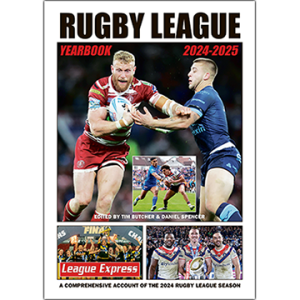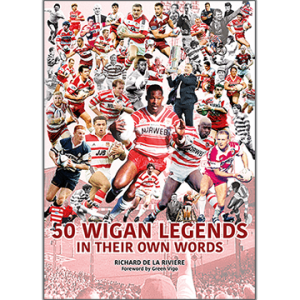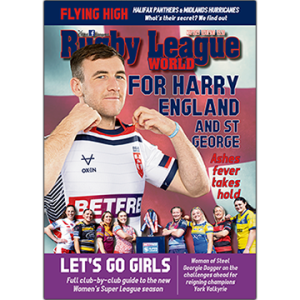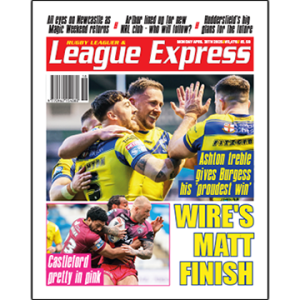
Tony Grimaldi was an outstanding backrow forward for Canterbury, Gateshead and Hull in the 1990s and 2000s.
His first senior try came in the 1998 NRL Grand Final.
The following season he was part of the inaugural Gateshead Thunder Super League team before their controversial ‘merger’ with Hull, whom he went on to captain.
He returned to the Bulldogs in 2002 when they were sensationally docked 37 competition points for major salary cap breaches.
He was a key figure in the rebuilding of the club, culminating in their Grand Final success over Adrian Morley’s Sydney Roosters in 2004.
If you could relive one day from your career, which would it be?
The 2004 Grand Final win with the Bulldogs. I loved the Challenge Cup in England, but we didn’t win it. We had a great rivalry with the Roosters and had both been in the top four for a while. I’d played in a Grand Final before, so I wasn’t nervous. We had such a good team, and we were so confident. Johnathan Thurston and Sonny Bill Williams were on the bench, which shows what sort of depth we had!
Did the Super League War work in your favour?
It came two years too early for me, but I did get a contract with Canterbury in 1996, having previously played for St George. I’ve got some good memories from those early years.
Playing with Barry Ward was great. He was my room-mate, and he was a funny guy. We played in the backrow a lot together.
Playing alongside Jason Hetherington was good as well. He was ruthless and tough, and we all loved him. He was a Terry Newton-type player. There were better players than Jason, but none tougher. Darren Britt was also outstanding in his peak.
In 1998, you played in arguably the greatest semi-final of them all. How did you beat Parramatta when you were 16 points down with nine minutes left?
I’ve watched it since and one thing that I didn’t realise at the time is that Parramatta were even more dominant than the score suggested. It should have been at least 30-2, not 18-2, going into the last ten minutes.
They had made so many breaks, but we scrambled well and managed to keep the score down. We’d made no breaks in that time and we’d been absolutely dominated. With nine minutes to go we finally scored, and things started happening. We scored twice more. It went to extra time and we were unstoppable by then. It gets replayed all the time. I’ve since worked with Dean Pay, Jim Dymock and David Penna, who all played for Parramatta, and I always make sure to remind them when it’s being repeated.
The Brisbane side of 1998 has to go down as one of the finest ever. How confident were you that you could turn them over, with the Bulldogs having finished ninth?
We did finish ninth, but we managed to go on a great run to the final. Nothing was expected of us in the final, so there wasn’t too much pressure. We were winning at half-time, and that was the only time in the play-off series that we had a half-time lead. In the four weeks before, we’d been losing to North Sydney, St George, Newcastle and Parramatta, and we’d ended up winning them all.
I’d never been more confident of victory than at half-time in that Grand Final against the Broncos, but we made a poor start to the second half. We needed a solid 10 or 15 minutes to grind them down, but they scored in their first set and they had too many attacking weapons in the end.
What are your first memories of Gateshead as you prepared for the 1999 Super League season?
I was used to pre-season training being in the heat in Sydney, not in the freezing cold and the dark. The grounds were often frozen, so we had to train indoors. I remember the bus ride to Castleford for our first trial match. It was cold and foggy and dark, and that was before the game!
There were only one or two of the players that I really knew before I got there, but I knew of most of them. There were a couple of Englishmen too, as well as Brian Carney. He was the only one of the young players to kick on. It was a good mix of players and we did well.
In the last three Super League games, you scored 150 points against Saints, Wakefield and Warrington, and you ended up in sixth place, just missing out on the top-five play-offs.
We beat St Helens twice and they ended up winning the comp, so we could clearly play. But I do remember Paul Newlove running over me a few times in the other game with Saints!
It was between Castleford and us for fifth spot, but they got it in the end. There was a drop off in the competition after sixth place. The lower teams were tough to beat away, but a lot easier at home.
We had a good team. Matty Daylight went really well on the wing. Steve Collins was very good at either centre or fullback. Luke Felsch was outstanding in the forwards, and so was Danny Lee when he was fit. He struggled with his back and we used to miss him when he didn’t play.
Kerrod Walters was the captain initially, but he returned to Australia halfway through the year when his wife was in an accident. We picked up Mick Jenkins from Workington to replace him, and he was a really good hooker.
How did you react to the bombshell that the club was closing down and merging with Hull?
It was hard for the players because we’d just settled in and most of our partners had jobs in the area. But my missus and I were relaxed about it. We’d travelled all the way to England, so what was another hour and a half down the road?
With so many of the Gateshead players, Hull instantly became competitive after the merger.
Yeah, but we also had Paul Broadbent (who had initially signed for Gateshead), Stanley Gene and some really good young players like Richard Horne, Paul Cooke and Paul King. Stanley was a real character. I didn’t get to know him too well, but he was such a good fella with a great vibe.
How much of the crowd trouble did you see after the Challenge Cup semi-final defeat by Leeds?
The players were in the dressing rooms, so I only saw the same as everyone else on the telly. A few of us went out to have a look, but it had calmed down by then. It was a shame for the club, but it wasn’t too hard for the players because we were more worried that we’d lost the game. We were in it for a good part, but Leeds had matchwinners like Iestyn Harris and some great forwards like Barrie McDermott, Darren Fleary, Anthony Farrell and a young Kevin Sinfield. We knew we’d done our best.
A year later you were 80 minutes from the Grand Final. How good was that team?
Jason Smith joined us that year and was an incredible player. We had a very good side in 2001 and pushed Wigan and Saints all the way in the play-offs, but we lost both matches by just a few points. Wigan took Jason out in the first play-off match. But we were still winning and with the advantage of playing at The Boulevard, I thought we had them. But the momentum turned, and they beat us 27-24.
We had a great rivalry with Wigan, but they tended to get us late on with someone like Andy Farrell or Jason Robinson making the difference.
You returned to the NRL with Canterbury in 2002 and were involved in one of Australia’s biggest Rugby League scandals. What are your recollections of the salary-cap episode?
The most disappointing thing was the club didn’t just go out and sign a bunch of internationals. On paper, there were other teams who looked better than us at the start of the year – maybe five or six teams. None of us knew what was going on – no-one knew what anyone else was getting paid, so we had no idea we were over the cap.
And then the news came out. We were stunned. We won 17 games in a row, certain to finish top, and we ended up with the wooden spoon!
Have you ever seen a young player make the impact that Sonny Bill Williams did in 2004?
No! He was playing centre when he scored twice on his debut against Parramatta, and he’d never played there before. He was so quick for his size that he could play the role, and he was just outstanding.
Michael Vella had told the Parra players in training that they’d belt the young kid, so it was funny that it was Vella that Sonny Bill stepped around when he scored one of his tries.
The competition wasn’t ready for Sonny Bill. He had amazing feet, he was so big, and his footwork was amazing. You couldn’t lock his arms up because he was so hard to tackle.
How tough was it to retire through injury and how long did it take you to accept you were no longer a professional Rugby League player?
2006 was my last year, although I’d just agreed to one more year in 2007 when I was forced to retire. I had 2008 in my head as well. It was tough during those two years because I thought I should still be playing. I was okay in 2009 because I knew I’d have finished by then. I missed the team spirit and the bonding and, above all, the buzz of winning.
What have you done since?
I play Oztag, but I tore part of my Achilles five months ago, so I’m showing my age! I worked at the Bulldogs from 2007 to 2020, doing fitness training and now I’m starting with Cronulla. It’s good to be involved still and to be part of a team, but it’s not the same as playing.
The above content is also available in the regular weekly edition of League Express, on newsstands every Monday in the UK and as a digital download. Click here for more details.




